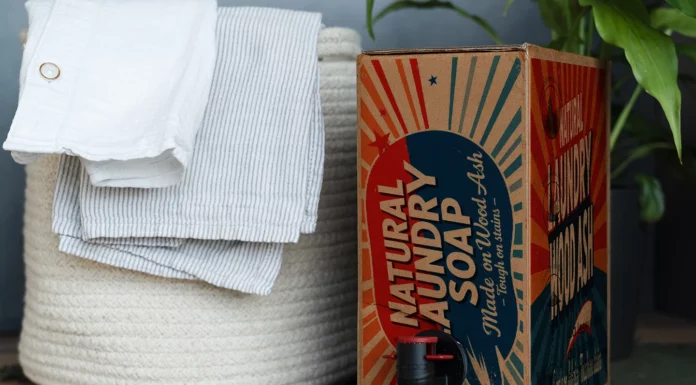Eco-Friendly Innovations in Cleansing: Harnessing Nature’s Chemistry
Recent developments signal a significant shift towards eco-friendly cleaning solutions. Notably, researchers have innovated a detergent formulated from cellulose nanofibers and corn protein, proving its comparability in stain removal to traditional synthetic detergents. With no harmful residues and fully biodegradable properties, such innovations offer a fresh perspective on what it means to clean sustainably.
The ancient method of using wood ash, mainly consisting of potash (potassium carbonate), provides effective cleaning by reacting with grease to form soap. This method not only revives colors and removes grease but does so with minimal environmental impact. The technique has seen refinement and entered niche markets through platforms like Etsy, where artisanal wood ash-based detergents cater to the eco-conscious consumer.
Advantages vs. Disadvantages: A Comparative Look
Advantages:
- Environmental Impact: Wood ash detergents are natural, biodegradable alternatives that avoid harmful chemicals pervasive in conventional detergents.
- Cost-Effectiveness: Especially appealing in economic downturns, wood ash can be readily sourced from domestic wood-burning processes, presenting a nearly cost-free solution for rural or self-sufficient households.
- Health Benefits: Free from synthetics known to aggravate allergies or respiratory issues, these natural detergents offer a safer option for sensitive populations.
Disadvantages:
- Consistency and Convenience: Preparation involves processes such as maceration and filtering which might deter modern consumers accustomed to ready-to-use products.
- Effectiveness Variability: While adept at handling certain stains like oil or tomato paste as proven in recent studies, wood ash detergents may struggle with others or vary in performance based on water hardness or other factors.
- Consumer Familiarity: The perception of wood ash solutions as outdated could hinder broader acceptance without significant education efforts.
Experts suggest that blending traditional methods with new technologies could overcome some barriers. For instance, combining wood ash with corn protein not only enhances cleaning power but also makes use more intuitive and satisfying for modern users.
Consumer Trends: Balancing Eco-Sensitivity with Demands for Effectiveness
While ecological sensitivity is on the rise, driven by heightened awareness of environmental issues across social media platforms such as X (formerly Twitter), effectiveness remains a top concern among consumers. Many still perceive chemical detergents as more effective for thorough cleans. Thus, convincing potential users often requires demonstrating that natural products do not compromise on cleanliness standards.
This dichotomy places manufacturers of natural detergents at a crossroads: they must innovate without forfeiting the ecological principles that make their products appealing to environmentally conscious consumers. The introduction of combination products that feature both traditional ingredients like wood ash and modern biotechnologies may provide the balance these consumers are seeking.
Future Outlook: Towards Mainstream Acceptance
The journey towards mainstream acceptance of wood ash-based laundry detergents will likely hinge on broadening consumer awareness about the ecological impacts of synthetic alternatives—particularly focusing on long-term health benefits over short-term convenience. A strategic blend of heritage marketing campaigns along with robust educational efforts could illuminate the advantages of returning to more traditional methods augmented by contemporary science.
As we look forward to potential shifts in manufacturing norms and consumer behaviors by 2030, integrating old-school wisdom with new-age innovation seems promising. By leveraging burgeoning trends in DIY production methodologies alongside industrial scale-ups facilitated by green chemistry advancements, wood ash-based detergents might just redefine cleanliness in our global society.
KEY FIGURES
- Potash content in wood ash provides effective cleaning for about 30 washes per 500ml batch (Source: Etsy product listing, 2025)[1].
- No recent broad statistical data specifically on consumer acceptance of wood ash-based detergents in the West was found in 2024-2025 searches.
RECENT NEWS
- March 2025: Researchers developed an eco-friendly detergent from cellulose nanofibers (wood fibers) and corn protein (zein), showing comparable cleaning effectiveness to commercial detergents while being sustainable and biodegradable[2]. This represents a modern, biobased detergent innovation linked to wood components but not traditional ash.
STUDIES AND REPORTS
- “Physical Cross-Linking of Cellulose Nanofibrils with Zein Particles as an Eco-Friendly Detergent” (2025, ACS Langmuir): This study concluded that natural detergents made from wood cellulose and corn protein effectively remove common stains (ink, oil, tomato paste) with low environmental impact, offering a potential alternative to chemical detergents with harmful ingredients like alkylphenol polyethoxylates and phosphates[2].
- Low-tech Lab Wiki on Ash Detergent (2024): Details the traditional preparation and use of wood ash detergent, emphasizing its very high pH and potash content, which reacts with grease to form soap. The product is stable (can be stored for over a year), natural, biodegradable, and harmless to water systems and septic tanks. However, care is needed during preparation due to ash dust irritants[3].
TECHNOLOGICAL DEVELOPMENTS
- Development of wood fiber + corn protein detergents as a modern eco-friendly alternative that combines natural ingredients with engineered emulsions for efficient stain removal and fabric care (2025)[2].
- Availability of artisanal wood ash-based detergents (e.g., 500 ml bottles on Etsy) targeted at niche markets like medieval reenactment or eco-conscious consumers, showing a small-scale commercial presence[1].
MAIN SOURCES
- https://www.etsy.com/listing/1446429888/lessive-a-la-cendre-de-bois — Commercial artisanal wood ash detergent, product details and consumer reviews (2025).
- https://www.acs.org/pressroom/presspacs/2025/march/researchers-create-eco-friendly-detergent-from-wood-fiber-and-corn-protein.html — Research news on new wood fiber-based eco detergent (2025).
- https://wiki.lowtechlab.org/wiki/Lessive_%C3%A0_la_cendre/en — Detailed low-tech preparation and use guide for wood ash detergents (2024).
- https://www.tyfinefurniture.com/blogs/blog/eco-friendly-alternatives-to-laundry-detergent — Context on natural laundry detergent alternatives and consumer eco-motivation (2023).
Additional synthesized insights:
- Advantages for consumers today: Wood ash detergent is 100% natural, biodegradable, with no synthetic chemicals, harmless to water systems, and low cost when made at home or purchased artisanally[1][3]. It revives colors and removes grease effectively due to high potash (potassium carbonate) content[1][3]. It can be stored long term without fermentation[3].
- Disadvantages: Potential irritant dust during preparation, less convenient than modern detergents (requires maceration and filtering), variable appearance, and consumer unfamiliarity may reduce uptake. It may not perform as consistently on all stains or fabric types compared to modern chemical detergents[3].
- Consumer ecological sensitivity vs. effectiveness: Increasing ecological awareness boosts interest in natural products, but many consumers prioritize convenience and perceived cleaning power. Studies on new biobased detergents (like wood fiber + corn protein) aim to combine ecological benefits with comparable or superior performance to mainstream chemical detergents[2]. Traditional ash detergents may face perception challenges due to being “old-fashioned” or less refined, requiring education and marketing to shift consumer views[2][3].
- Ecological advantages vs. supermarket detergents: Wood ash detergents avoid synthetic surfactants, phosphates, and microplastics. Their biodegradability reduces aquatic toxicity and eutrophication risks. They can be produced locally from waste wood ash, lowering carbon footprint and packaging waste[1][3][4]. Conventional detergents often contain chemicals harmful to ecosystems and sensitive human populations[4].
- Who is concerned: Eco-conscious consumers, zero-waste and low-tech lifestyle adherents, rural or off-grid families, and niche markets such as historical reenactors[1][3]. Also, initiatives in green chemistry research sectors are exploring scalable natural detergents for larger markets[2].
- Availability in 2025: Artisanal products can be purchased online; home preparation remains a viable option for enthusiasts. Industrial scale natural detergent alternatives are emerging but wood ash detergent itself remains a niche product[1][2][3].
- Regulations and policies: No specific regulations found targeting wood ash detergents; however, increasing restrictions on phosphate and microplastic content in detergents in Western countries could indirectly favor ash-based or natural detergent alternatives.
This summary highlights the current state and future prospects for wood ash-based laundry detergents, combining traditional knowledge with recent scientific innovations and consumer trends.
Other references:
etsy.com – Wood Ash Laundry Detergent
acs.org – Researchers create eco-friendly detergent from wood fiber …
wiki.lowtechlab.org – Ash detergent – Wiki Low-tech
tyfinefurniture.com – Eco-Friendly Alternatives to Laundry Detergent
weyerhaeuser.com – Wood Ash
kindlaundry.com – Source
researchgate.net – Source
researchgate.net – Source
sciencedirect.com – Source
link.springer.com – Source
sciencedirect.com – Source
ecologyworks.com – Source
sciencedaily.com – Source
herbalstrategi.com – Source
mydecorative.com – Source
dinobidetergent.com – Source
renegadebrands.com – Source
oshlife.com – Source
stppgroup.com – Source
x.com – Source
x.com – Source
x.com – Source
x.com – Source
x.com – Source
x.com – Source



